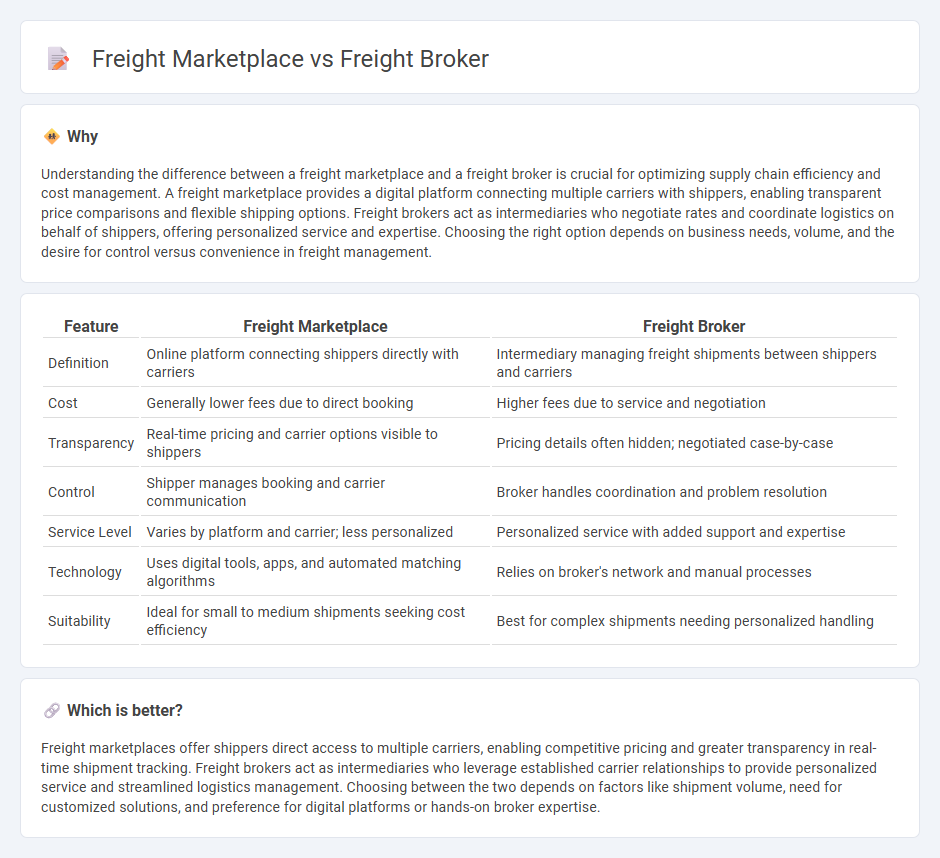
Freight marketplaces offer digital platforms connecting shippers directly with carriers, enhancing transparency and reducing costs through real-time bidding and automated matching algorithms. Freight brokers act as intermediaries managing carrier relationships and negotiating shipments on behalf of shippers to optimize route planning and load consolidation. Explore the key advantages of each to determine the best logistics solution for your shipping needs.
Why it is important
Understanding the difference between a freight marketplace and a freight broker is crucial for optimizing supply chain efficiency and cost management. A freight marketplace provides a digital platform connecting multiple carriers with shippers, enabling transparent price comparisons and flexible shipping options. Freight brokers act as intermediaries who negotiate rates and coordinate logistics on behalf of shippers, offering personalized service and expertise. Choosing the right option depends on business needs, volume, and the desire for control versus convenience in freight management.
Comparison Table
| Feature | Freight Marketplace | Freight Broker |
|---|---|---|
| Definition | Online platform connecting shippers directly with carriers | Intermediary managing freight shipments between shippers and carriers |
| Cost | Generally lower fees due to direct booking | Higher fees due to service and negotiation |
| Transparency | Real-time pricing and carrier options visible to shippers | Pricing details often hidden; negotiated case-by-case |
| Control | Shipper manages booking and carrier communication | Broker handles coordination and problem resolution |
| Service Level | Varies by platform and carrier; less personalized | Personalized service with added support and expertise |
| Technology | Uses digital tools, apps, and automated matching algorithms | Relies on broker's network and manual processes |
| Suitability | Ideal for small to medium shipments seeking cost efficiency | Best for complex shipments needing personalized handling |
Which is better?
Freight marketplaces offer shippers direct access to multiple carriers, enabling competitive pricing and greater transparency in real-time shipment tracking. Freight brokers act as intermediaries who leverage established carrier relationships to provide personalized service and streamlined logistics management. Choosing between the two depends on factors like shipment volume, need for customized solutions, and preference for digital platforms or hands-on broker expertise.
Connection
Freight marketplaces and freight brokers are interconnected through their roles in streamlining transportation logistics by matching shippers with carriers. Freight brokers act as intermediaries who leverage freight marketplaces' digital platforms to access a broad network of carriers, optimizing load fulfillment and pricing efficiency. This collaboration enhances supply chain transparency, reduces empty miles, and accelerates freight movement across regions.
Key Terms
Intermediary
Freight brokers act as intermediaries by directly connecting shippers with carriers, managing negotiations, contracts, and ensuring compliance throughout the shipping process. Freight marketplaces serve as digital platforms where multiple shippers and carriers can interact independently, offering a more transparent and competitive environment. Explore the key differences between these intermediary models to optimize your logistics strategy.
Digital Platform
Freight brokers act as intermediaries connecting shippers with carriers by negotiating rates and managing logistics through personalized service, while freight marketplaces provide a digital platform where multiple carriers and shippers interact directly in real time for instant pricing and availability. Digital platforms emphasize automation, transparency, and efficiency by leveraging advanced algorithms, AI-driven matching, and integrated tracking systems that reduce manual coordination. Explore deeper insights into how digital platforms transform freight operations and optimize supply chain management.
Load Matching
Freight brokers act as intermediaries by directly connecting shippers with carriers, offering personalized negotiation and trusted service. Freight marketplaces provide an automated platform where multiple carriers and shippers list and match loads in real-time, enhancing transparency and efficiency. Explore in-depth comparisons to understand which load matching solution best suits your logistics needs.
Source and External Links
Freight broker - Wikipedia - A freight broker is an intermediary between shippers and freight service providers, specializing in various types of freight transport and requiring licensing from the FMCSA in the United States.
What Does a Freight Broker Do? (With Requirements) - Indeed - Freight brokers connect shippers with motor carriers, negotiating pricing, managing shipment documentation, tracking freight, and resolving delivery issues to ensure goods arrive safely and on time.
Your 12-Step Guide on How to Become a Freight Broker - Truckstop - Freight brokers earn money by matching shippers with carriers, operating under their own licenses, and making commissions based on the loads they move, with average salaries around $62,000 annually.
 dowidth.com
dowidth.com